6,7,4'-Trihydroxyisoflavone

6,7,4'-Trihydroxyisoflavone structure
|
Common Name | 6,7,4'-Trihydroxyisoflavone | ||
|---|---|---|---|---|
| CAS Number | 17817-31-1 | Molecular Weight | 270.23700 | |
| Density | 1.548g/cm3 | Boiling Point | 587.1ºC at 760mmHg | |
| Molecular Formula | C15H10O5 | Melting Point | N/A | |
| MSDS | N/A | Flash Point | 229.7ºC | |
Use of 6,7,4'-TrihydroxyisoflavoneDesmethylglycitein (4',6,7-Trihydroxyisoflavone), a metabolite of daidzein, sourced from Glycine max with antioxidant, and anti-cancer activities.Desmethylglycitein binds directly to CDK1 and CDK2 in vivo, resulting in the suppresses CDK1 and CDK2 activity[1]. Desmethylglycitein is a direct inhibitor of protein kinase C (PKC)α, against solar UV (sUV)-induced matrix matrix metalloproteinase 1 (MMP1)[2]. Desmethylglycitein binds to PI3K in an ATP competitive manner in the cytosol, where it inhibits the activity of PI3K and downstream signaling cascades, leading to the suppression of adipogenesis in 3T3-L1 preadipocytes[3]. |
| Name | 4',6,7-trihydroxyisoflavone |
|---|---|
| Synonym | More Synonyms |
| Description | Desmethylglycitein (4',6,7-Trihydroxyisoflavone), a metabolite of daidzein, sourced from Glycine max with antioxidant, and anti-cancer activities.Desmethylglycitein binds directly to CDK1 and CDK2 in vivo, resulting in the suppresses CDK1 and CDK2 activity[1]. Desmethylglycitein is a direct inhibitor of protein kinase C (PKC)α, against solar UV (sUV)-induced matrix matrix metalloproteinase 1 (MMP1)[2]. Desmethylglycitein binds to PI3K in an ATP competitive manner in the cytosol, where it inhibits the activity of PI3K and downstream signaling cascades, leading to the suppression of adipogenesis in 3T3-L1 preadipocytes[3]. |
|---|---|
| Related Catalog | |
| Target |
CDK1 CDK2 PKC |
| In Vitro | Desmethylglycitein (4',6,7-Trihydroxyisoflavone)(0-100 μM; 24-72 hours) suppesses anchorage-dependent growth of HCT-116 and DLD1 cells in a dose- and time-dependent manner without cytotoxicity [1]. Desmethylglycitein (4',6,7-Trihydroxyisoflavone)(0-100 μM; 24-72 hours) suppresses CDK1 activity in a dose-dependent manner and inhibits CDK2 activity in HCT-116 cells[1]. Desmethylglycitein (4',6,7-Trihydroxyisoflavone)(0-100 μM; 24-72 hours) induces cell cycle arrest at the S and G2/M phases, the percentage of cells in S phase is higher in the 100 μM 6,7,4′-THIF-treated group, and the same pattern is observed in G2/M phase (29.5% versus 19.1% ) [1]. Cell Viability Assay[1] Cell Line: HCT-116 cells Concentration: 0, 12.5, 25, 50 or 100 μM Incubation Time: 24, 48 or 72 hours Result: Inhibited anchorage-dependent and -independent growth of HCT-116 cells. Western Blot Analysis[1] Cell Line: HCT-116 and DLD1 cells Concentration: 0, 25, 50 or 100 μM Incubation Time: 48 hours Result: Inhibited CDK1,CDK2 expression. Cell Cycle Analysis[1] Cell Line: HCT-116 cells Concentration: 0, 25, 50 or 100 μM Incubation Time: 24, 48 or 72 hours Result: Induces cell cycle arrest of HCT-116 cells at S and G2/M phases. |
| In Vivo | Desmethylglycitein (4',6,7-Trihydroxyisoflavone) (intraperitoneally injection; 5 or 25 mg/kg; once daily; 20 days) suppresses tumor development in mice and serves as an effective anticancer treatment with the potential to inhibit or delay the tumorigenicity of HCT-116 cells in an in vivo system[1]. Animal Model: Female athymic nude mice subcutaneously injected with HCT-116 cells[1] Dosage: 5 or 25 mg/kg Administration: Intraperitoneally injection; 5 or 25 mg/kg; once daily; 20 days Result: Decreased tumor growth, volume and weight of HCT-116 xenografts. |
| References |
| Density | 1.548g/cm3 |
|---|---|
| Boiling Point | 587.1ºC at 760mmHg |
| Molecular Formula | C15H10O5 |
| Molecular Weight | 270.23700 |
| Flash Point | 229.7ºC |
| Exact Mass | 270.05300 |
| PSA | 90.90000 |
| LogP | 2.57680 |
| Vapour Pressure | 2.21E-14mmHg at 25°C |
| Index of Refraction | 1.732 |
| Safety Phrases | 22-24/25 |
|---|---|
| WGK Germany | 3 |
| HS Code | 2914501900 |
|
~% 
6,7,4'-Trihydro... CAS#:17817-31-1 |
| Literature: Phytochemistry, , vol. 34, # 4 p. 979 - 981 |
|
~30% 
6,7,4'-Trihydro... CAS#:17817-31-1 |
| Literature: Klus; Borger-Papendorf; Barz Phytochemistry, 1993 , vol. 34, # 4 p. 979 - 981 |
|
~51% 
6,7,4'-Trihydro... CAS#:17817-31-1 |
| Literature: Vasquez-Martinez, Yesseny; Ohri, Rachana V.; Kenyon, Victor; Holman, Theodore R.; Sepulveda-Boza, Silvia Bioorganic and Medicinal Chemistry, 2007 , vol. 15, # 23 p. 7408 - 7425 |
|
~59% 
6,7,4'-Trihydro... CAS#:17817-31-1 |
| Literature: Jah, Hem Chandra; Zilliken, Fritz; Breitmaier, Eberhard Angewandte Chemie, 1981 , vol. 93, # 1 p. 129 - 130 |
|
~40% 
6,7,4'-Trihydro... CAS#:17817-31-1 |
| Literature: Phytochemistry, , vol. 34, # 4 p. 979 - 981 |
|
~40% 
6,7,4'-Trihydro... CAS#:17817-31-1 |
| Literature: Phytochemistry, , vol. 34, # 4 p. 979 - 981 |
| HS Code | 2914501900 |
|---|---|
| Summary | 2914501900 other ketone-phenols。Supervision conditions:None。VAT:17.0%。Tax rebate rate:9.0%。MFN tariff:5.5%。General tariff:30.0% |
| Demethyltexasin |
| 6,7,4'-trihydroxyisoflavone |
| 6,7-dihydroxy-3-(4-hydroxyphenyl)chromen-4-one |
| 4',6,7-trihydroxy-isoflavone |
| 6-hydroxydaidziein |
| 6-Hydroxydaidzein |
| MFCD00016953 |
| 6,7,4'-trihydroxyisoflavon |
| 6,7-dihydroxy-3-(4-hydroxyphenyl)-4H-chromen-4-one |
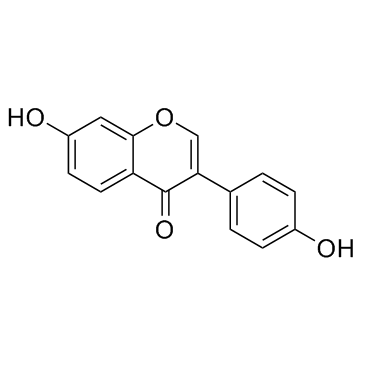
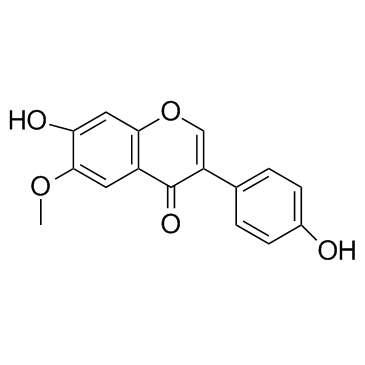
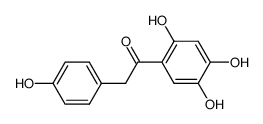
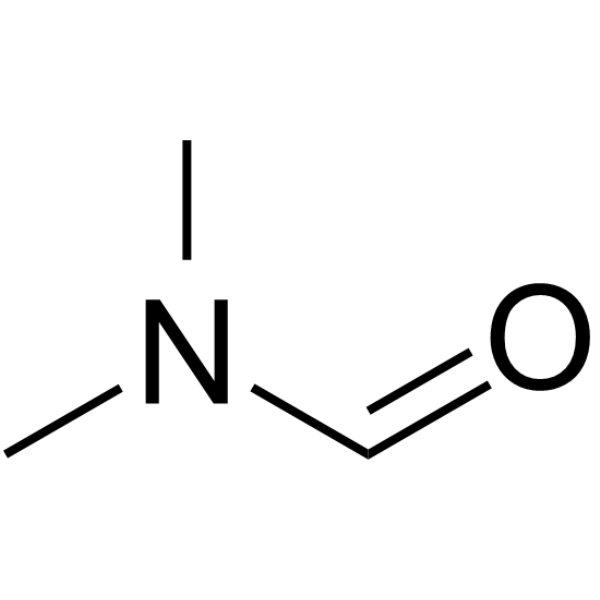
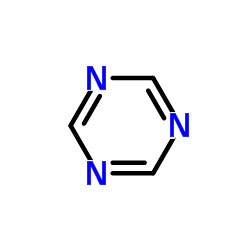

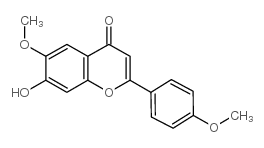 CAS#:550-79-8
CAS#:550-79-8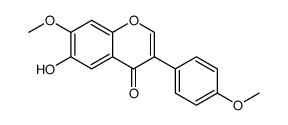 CAS#:970-48-9
CAS#:970-48-9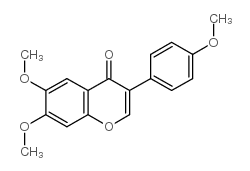 CAS#:798-61-8
CAS#:798-61-8
